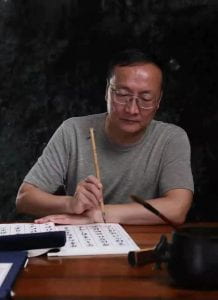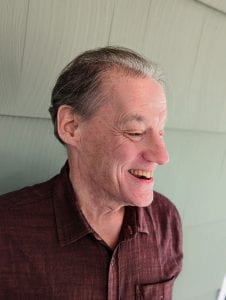The English Department bids a fond farewell to Ning Yu, who is retiring to devote more time to his writing.

Initially trained and educated as an aeronautical engineer and international relations expert in China, Professor Yu read Thoreau one evening after work and his life—and our department—was forever changed.
Jettisoning his first career and blasting off in a new direction to follow his new-found love of American literature, Ning moved to the U.S. and became a scholar and teacher of Nineteenth-Century American literature and ecocritical studies.
“I could have worked for Boeing,” he once said. “But I’m glad I didn’t.”
Known for his engaging class discussions and the wide breadth of the readings he assigns, Ning is the author of 5 books and dozens of articles, essays and commentaries. In fact, his most immediate motivation for retirement is to devote himself more fully to his writing and scholarship. He is under contract for an annotated edition of the complete works of Xun Zi, a classic Chinese philosopher, and he has recently published a collection of essays and a book of Chinese literary criticism. In China his essays and nonfiction have been reprinted in The Best Essays of the Year volumes.
“Prof. Yu taught with distinction in the English Department for thirty years,” notes English Chair Kelly Magee. “Nin has been instrumental in developing our Literature curriculum, including specialty courses in Asian American Literature, Nature Writing, and Ecocriticism, and he has taught a variety of literature courses to students at all levels of our undergraduate and graduate curriculum. Prof. Yu’s colleagues will miss him profoundly, and they have greatly appreciated his dedication and good humor, as well as his advocacy on behalf of faculty and students, including frequently serving as an advisor for the literature program.”
Professor Yu earned his Ph.D. at the University of Connecticut, writing his dissertation on Thoreau’s metaphorical use of geography. He has taught at Western since 1993, offering a wide range of courses in American Literature, nature writing, and eco-criticism.
A whole-hearted engagement with research and literature characterized Ning’s entire career at Western. His interest in Thoreau and eco-criticism led him to ask how poets from centuries ago envisioned their interactions with the environment. These questions led him to a years-long study of more than 60,000 poems from the Tang Dynasty. This research resulted in two well-received books, Borrowed from the Great Lump of the Earth: An American Ecocritic’s Translation of Tang Poems, and a second volume, In Response to the Howling Monkeys along the Yangtze: An American Ecocritic’s Translation of 315 Tang Poems.
Professor Yu’s research included physical field-work as well as archival and literary investigations. Exploring the Angel Island Immigration Center, where Asian immigrants were detained for extended periods following the Chinese Exclusion Act of 1882, he discovered Chinese poetry and other textual remnants carved into the walls of the buildings. After transcribing and preserving these texts, he researched similar carvings along the railroad Chinese Americans built, following the tracks and history all the way to Utah. These texts enlivened his courses and helped Western students to better understand the lives and contributions of Chinese American laborers to the American West.
